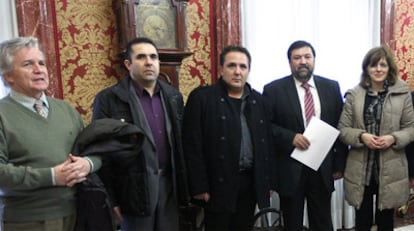Plan drawn up for stolen children cases
Justice minister promises action over Franco-era illegal adoption network
"Such grievous actions cannot go unpunished. The guilty parties must feel the full weight of the law. It is a matter of dignity." So said Justice Minister Francisco Caamaño on Wednesday, after emerging from a 90-minute meeting with relatives of newborns who were stolen from their mothers and sold to childless couples under Franco's rule and in the early years of democracy. "Our Ministry is willing to cooperate with them fully."
Historical research, together with High Court Judge Baltasar Garzón's own investigations, suggest some 30,000 children may have been the victims of a baby trade that began in the early 1940s and ended three decades later. It began as political reprisals against women who supported the Republican side during the war, but ended up as a thriving business that found support in a law that favored illegal adoptions until 1987.
In late January, a lawyer named Enrique Vila and Antonio Barroso, who discovered three years ago that his parents bought him for 200,000 pesetas, took 400 stolen children cases to the Attorney General's Office. They believe these cases qualify as illegal detention or kidnapping.
"It was a very well organized network," said Vila. "There were recruiters in charge of finding the parents and recruiters in charge of finding the children. The providers of adoptive parents were women with social connections. The providers of children were doctors, midwives, nursing assistants and members of religious communities who were supposedly performing an act of Christian charity. The coercion they subjected women to was brutal."
Those now searching for lost children or siblings are asking Minister Caamaño for a DNA databank and a review of privacy laws to help them in their search. They also want a dedicated government office to oversee the issue.
Caamaño promised to create "a specific program" at the National Toxicology Institute, in coordination with regional health departments, to ensure that DNA tests are free of charge for these relatives as long as a court grants permission to conduct them. He also promised to appoint a ministry coordinator to help families in their search.

Tu suscripción se está usando en otro dispositivo
¿Quieres añadir otro usuario a tu suscripción?
Si continúas leyendo en este dispositivo, no se podrá leer en el otro.
FlechaTu suscripción se está usando en otro dispositivo y solo puedes acceder a EL PAÍS desde un dispositivo a la vez.
Si quieres compartir tu cuenta, cambia tu suscripción a la modalidad Premium, así podrás añadir otro usuario. Cada uno accederá con su propia cuenta de email, lo que os permitirá personalizar vuestra experiencia en EL PAÍS.
¿Tienes una suscripción de empresa? Accede aquí para contratar más cuentas.
En el caso de no saber quién está usando tu cuenta, te recomendamos cambiar tu contraseña aquí.
Si decides continuar compartiendo tu cuenta, este mensaje se mostrará en tu dispositivo y en el de la otra persona que está usando tu cuenta de forma indefinida, afectando a tu experiencia de lectura. Puedes consultar aquí los términos y condiciones de la suscripción digital.








































